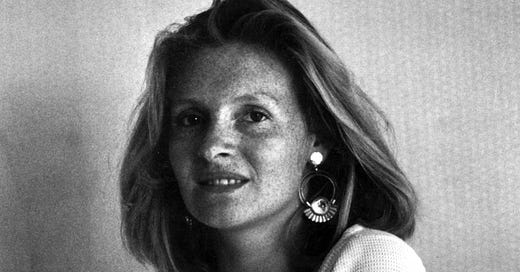I Know Sophie Toscan du Plantier
May is Sophie month on Crime Guy with a new interview and some new articles.
In May I am interviewing a journalist and author who lives in Ireland. She’s a Sophie expert who has been fearless in pursuing her own theories about what happened in December 1996. Leading up to that there will be more posts on Sophie throughout the month of May.
Sophie belongs to a time before smartphones and social media but she was such a personality in France that there are many high quality photos of her. This is one of my favourites. I think she looks completely different in each photo. She was a complex, self-reliant artistic person. She would have had no clue that she was in danger in Ireland.
This article looks again at what it means to ‘know’ another person. This is a surprisingly fluid thing. You know your friends and family, one presumes. No debate there. You know your colleagues, perhaps a little less well, especially if you’re in a new job. All good so far.
What do the police mean when they ask if you know someone?
Do I know the King of England? I have never met him. But I know what he looks like and I have seen him in photos and on the news. I once saw the late Queen through the window of her car. I do not know either of these people. But what should I tell the police? I would recognise them in a line up.
Do I know Stevie Nicks? I have seen her live many times. I know what she sounds and looks like in every decade of the last fifty years. She doesn’t know what I look like and we have never met. No, I do not know her.
Do I know Rupert Graves? He knows what I look like. We spoke a few words at a literary thing a few years ago. My friend wanted a selfie. I took the picture. He doesn’t know my name. I don’t have his number. No, I do not know him.
What does it mean to know someone?
Do I know myself? Sometimes I wonder about that. But I would say yes to the police if they insisted.
I think the truth is quite simple. If the police are wanting to know, and it is clear that their person of interest is a suspect, you will downplay any association with that person. This will happen automatically. “Well, I know what he looks like. I saw him in the pub once, maybe two years ago. Yes, I have his number. No, I do not know him at all.”
The West Cork police, in my view erroneously, firmly believed that Sophie was ‘known’ to her killer. But what did they mean by that?
Could it have been her neighbour, Alfie? Could it have been Ian Bailey? No it could not because he did not know her. Nobody has ever produced a statement and certainly not a photo that links Bailey to Sophie. So if she knew her killer then Bailey is in the clear. Anything Marie Farrell said has to be discounted.
At some point, Ian Bailey says he thinks he saw Sophie through a window when he was visiting Alfie Lyons. In no world does this mean he knew her. Now we do have a problem. Bailey repeatedly claimed to local people that he did know Sophie. Why would he do that?
It is patently obvious why this self-obsessed narcissist pretended to know Sophie. It would help him sell the news stories he was writing about the case, and it would increase his standing in the investigation. I believe this approach developed before he realised he was becoming the prime suspect.
Another problem Bailey had was his innocence. Like a child, he believed he could not be a suspect because he was not the killer. So he could say pretty much anything he wanted. This simplistic and naive approach became his downfall.
No, Ian Bailey never did know Sophie. I think the police are wrong about her killer being known to her. What do you think?





Looking forward to the interview
Spot-on (though I'm probably not an expert on anything...).